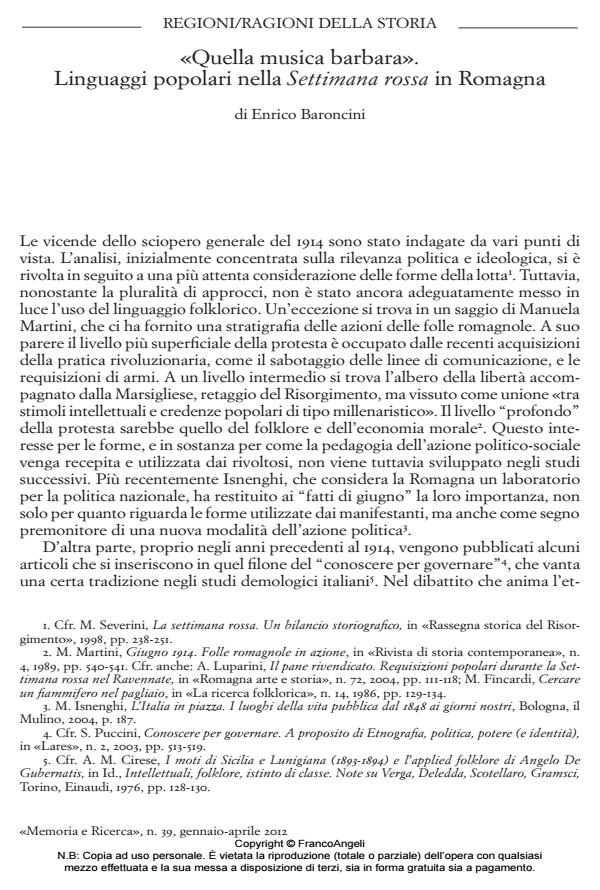"Quella musica barbara". Linguaggi popolari nella Settimana rossa in Romagna
Titolo Rivista MEMORIA E RICERCA
Autori/Curatori Enrico Baroncini
Anno di pubblicazione 2012 Fascicolo 2012/39
Lingua Italiano Numero pagine 18 P. 139-156 Dimensione file 147 KB
DOI 10.3280/MER2012-039009
Il DOI è il codice a barre della proprietà intellettuale: per saperne di più
clicca qui
Qui sotto puoi vedere in anteprima la prima pagina di questo articolo.
Se questo articolo ti interessa, lo puoi acquistare (e scaricare in formato pdf) seguendo le facili indicazioni per acquistare il download credit. Acquista Download Credits per scaricare questo Articolo in formato PDF

FrancoAngeli è membro della Publishers International Linking Association, Inc (PILA), associazione indipendente e non profit per facilitare (attraverso i servizi tecnologici implementati da CrossRef.org) l’accesso degli studiosi ai contenuti digitali nelle pubblicazioni professionali e scientifiche.
During the general strike of 1914 in Romagna the mobilization of the members of the progressive parties and trade unions was large and unexpected, taking in some cases a revolutionary character. The actions of the protesters, among which there were destruction of churches and railways, were assimilated by the conservative press, and by some of the progressive, as purely criminal acts. In some cases, however, traces of charivari appear, which is an appropriate language for the political aims of the protesters. The use of the ambiguous symbol of the liberty tree in the strike demonstrations in Romagna is analyzed in the various components of both politics and folklore.
Parole chiave:Traditional cultures, charivari, liberty tree, general strike, popular riots, Romagna.
- Protest, Popular Culture and Tradition in Modern and Contemporary Western Europe Ilaria Favretto, pp.1 (ISBN:978-1-137-50736-5)
- Protest, Popular Culture and Tradition in Modern and Contemporary Western Europe Ilaria Favretto, Marco Fincardi, pp.149 (ISBN:978-1-137-50736-5)
- Protest, Popular Culture and Tradition in Modern and Contemporary Western Europe Xabier Itçaina, pp.229 (ISBN:978-1-137-50736-5)
- Cultures of Protest and Industrial Conflict in Italy since 1945 Ilaria Favretto, (ISBN:9780191888397)
- Protest, Popular Culture and Tradition in Modern and Contemporary Western Europe Marco Manfredi, pp.103 (ISBN:978-1-137-50736-5)
Enrico Baroncini, "Quella musica barbara". Linguaggi popolari nella Settimana rossa in Romagna in "MEMORIA E RICERCA " 39/2012, pp 139-156, DOI: 10.3280/MER2012-039009